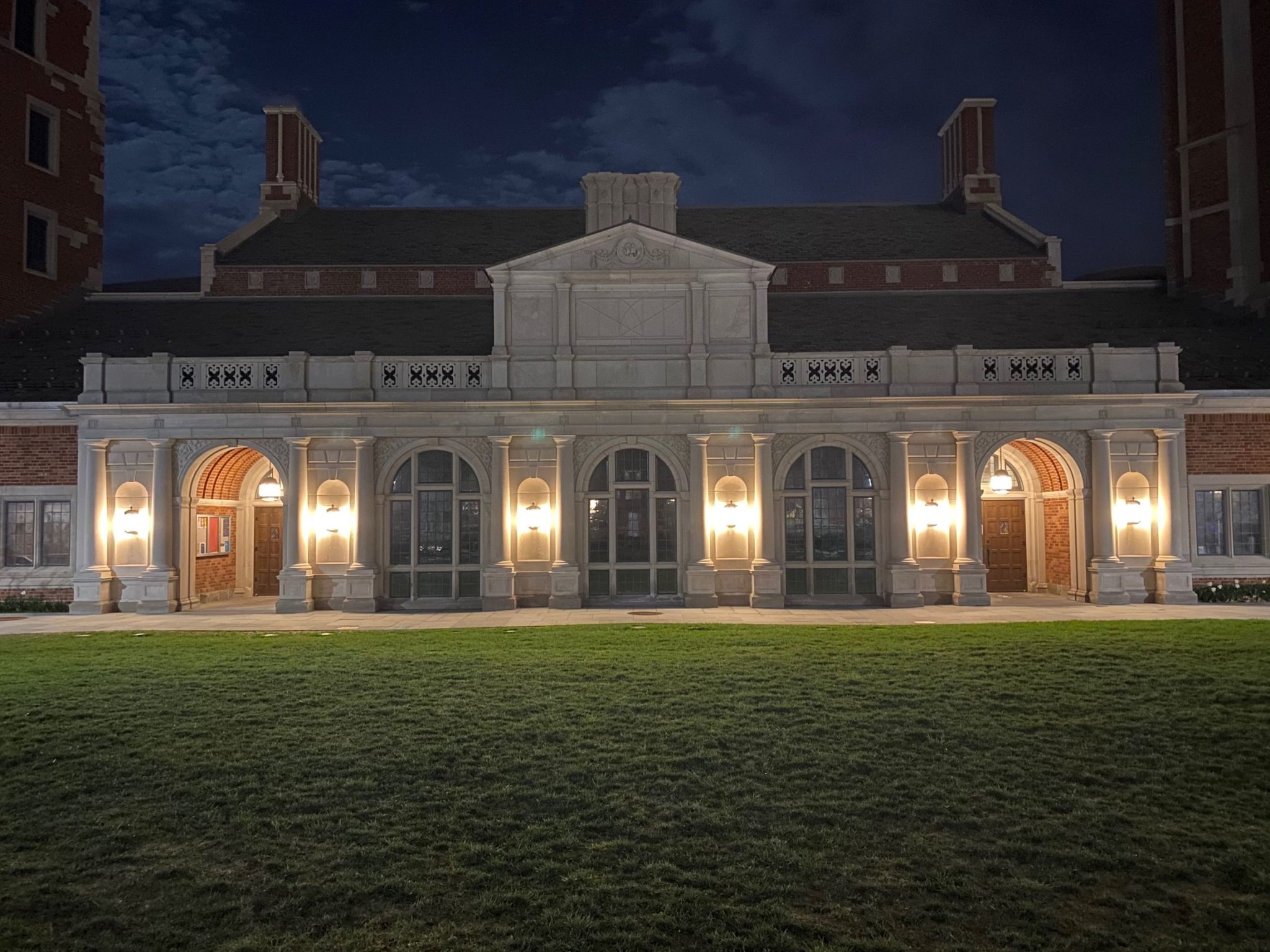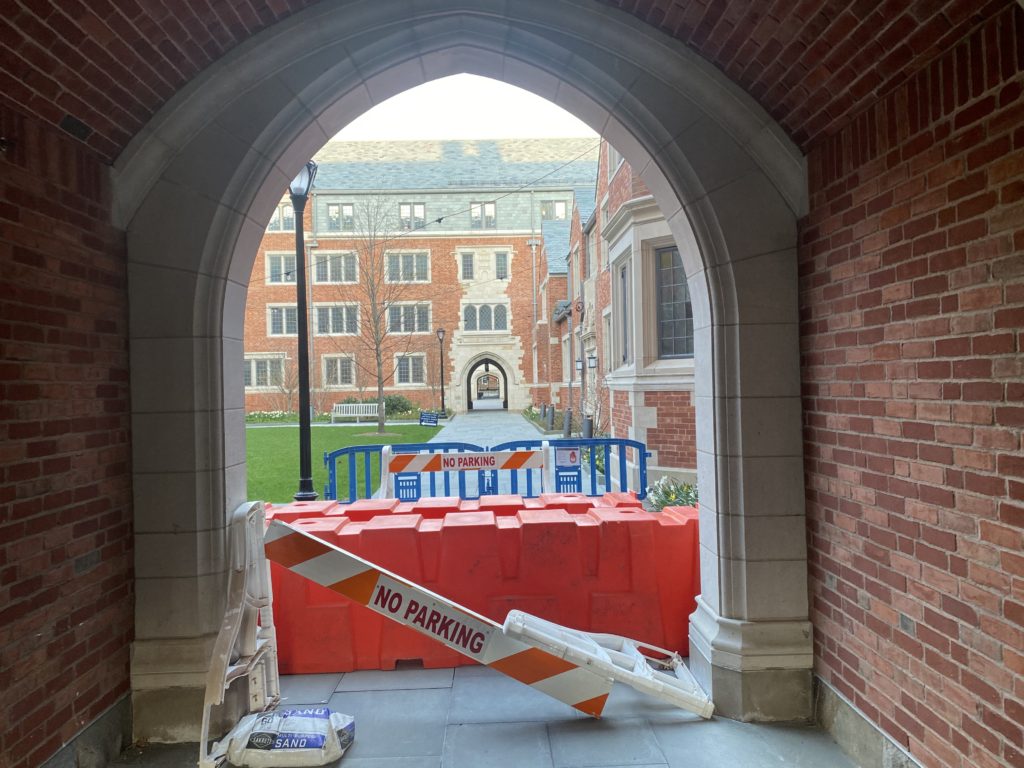
Courtesy of Tina Lu
In the long twilight and the low-hanging space between Pauli Murray College and Yale Health, a couple can often be found shepherding their dog down the Canal Street bicycle path. The dog’s name is Gwen, and the humans’ names are Tina Lu and Stuart Semmel — the head and associate head, respectively, of Pauli Murray College.
On usual “school nights,” as Lu describes them, the trio runs into others walking down the path. Now, though, they may go more than half an hour without encountering another soul. Gwen, normally social and curious, leaps nervously at the fluttering of plastic bags.
“She has become a jittery dog in a way that she has never been her whole life,” Lu observed. “I feel like Gwen is speaking for all of us — that we feel unsettled.”
As head of Pauli Murray College, Lu has had a front row seat to the developments on campus — from the announcement of the implementation of online courses to the clearing of several entryways in her college for New Haven first responders seeking to self-isolate to protect their families’ health.
The college has been cordoned off with traffic barricades and fences to protect the living spaces of the dean and head of college. Laminated signs proclaiming “DO NOT ENTER” hang on some entryway doors.

No first responders have moved into the college yet. But in the meantime, “the college — the building itself — feels empty but waiting,” Lu said.
“We’re used to the ebb and flow that comes when December break comes around and students leave. It comes in the summer before conferences start filling up the street again,” Semmel said. “New Haven always has these moments where it feels surprisingly empty, but this goes far beyond that.”
For people who live within a residential college, like Lu and Semmel, that emptiness has been especially noticeable. The dining hall, usually a bustling hub marked by an effusion of light, is dark. The rooms, too, are missing their late-night glow from the occasional studying night owl.
“There’s a deep sense of latent anxiety around that I totally feel and that I pick up from children and colleagues and friends and students,” Lu noted.
Even while her students are away, Lu continues to lend an ear. She says they deserve “self-love and forgiveness,” just as she has been trying to practice with herself. She added that, while students might feel their lost Yale semester seems trivial “in this world, in all that everybody is going through,” she still felt it was important to acknowledge that “all of you folks did have something important and precious taken from you.”
The ubiquitous feeling of anxiety has affected Lu’s own academic work, she said. “My mind is so occupied by the magnitude of what is going on,” Lu said. What was looking like a productive year for academic research for Lu has taken a turn — now she focuses on preparing for classes, proofreading and looking up references. “In a way that is self-protecting, I have been working not to produce a lot of profound thoughts,” she added.
Still, she was quick to point out, she is “doing fine.”
“My loved ones are fine physically,” Lu said. “My 94-year-old mother-in-law who lives a few blocks away from our house … knock wood, so far she seems fine.”
Overall, Lu describes her schedule as “fairly chaotic.” One grocery trip took three hours as stores only let in a few people at a time. “All of these things in life that used to seem like you were really barely counting as things that took up time are now taking up a lot of time,” she said.
As for her school schedule, she said that many of her usual meetings have now simply moved to Zoom. But as an academic, she said, she normally has more of a routine, and it has been “absolutely freaky” to see it thrown into flux.
At this time of year, other events on Lu’s family’s calendar have been affected as well.
While the family still held two Passover Seders on their own last week, Lu said, they missed hosting their usual college-wide Seder — an event that Semmel said typically draws 30 to 40 students, many of whom are experiencing the ceremonial Jewish dinner for the first time.
Lu added that the family — Lu, Semmel and their five children — was not sure it had enough supplies for the duration of Passover. Her family bought four boxes of Trader Joe’s matzah, which she said they would usually be able to go through at the Seder. A later update from Semmel confirmed that some of the matzah was still intact on the sixth day of Passover, due in part to the relatively small contingent in the family who enjoyed eating it outside of “rabbinical injunction.”
“But, of course, I also feel like the hunkering down for a plague is totally in the spirit of Passover,” Lu added with levity.
With two of her daughters in their senior year of high school, Lu said she is enjoying the family time. Semmel said that he has taken to watching “The Good Place” on Netflix, and the family has also found amusement in works of Laura Ingalls Wilder.
“Every member of our family is quoting ‘The Long Winter,’” Lu mused. “We are all kind of entertained by it, even though it does feel kind of dire and scary.”
And, as Lu and Semmel revealed on Sunday, the family has adopted a new dog, Fitzwilliam “Fitz” Darcy. “We knew that our existing dog would appreciate the company,” Semmel said. “He’s attached to us.”
Still, Lu said she does interact with people outside her household. According to Senior Administrative Assistant to the Head of College Suzette Courtmanche, Pauli Murray community events — including a college tea and a family dinner concert, as well as Pauli Murray College Council and housing meetings — have shifted to the virtual sphere.
“While I have been grateful to catch up with many PauliMurs on Zoom, I think that we all miss the small, unplanned interactions the most: random conversations in the courtyard or while waiting in line for chicken tenders in the dining hall,” Rosas wrote in an email to the News.

Lu’s network, while mostly relegated now to the confines of a computer screen, has some continuation in the real world: Lu said she especially enjoys running into Head of Benjamin Franklin College Charles Bailyn while the two are out walking their dogs. They stand 10 feet apart and shout to each other. “It’s so nice to see somebody that you care for in real life,” Lu said.
“It’s always good to see them,” Bailyn said, referring to Lu and Semmel. The heads of the two northernmost colleges and their families have been looking out for each other, making grocery runs for each other in an attempt to “make as few visits as possible these days,” Bailyn said. The families also let their dogs play together in the courtyards in the absence of students, he added.
Even so, Semmel said he noticed that the current crisis has changed how strangers — as opposed to friends — interact. “Social interactions do fray,” he said. “There’s less eye contact than there was weeks ago. … It’s good to cover our faces with masks but bad to have less of a face to show the world and to not be able to really smile at someone.”
“It’s … not good for civic life — whether that civic community is that of a university, a city, a country, a world,” he said.
“When will normal appear again?” Lu asked. She said she had “no sense” of that timeline.
While the world searches for answers, she and Semmel will continue walking their dogs.
Giovanna Truong | giovanna.truong@yale.edu
This story is part of a larger series profiling Yale and New Haven community members during the COVID-19 pandemic. To read more, click here.







